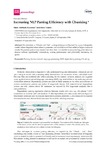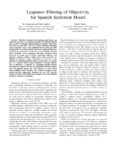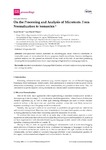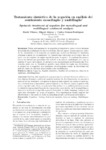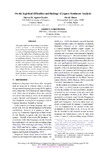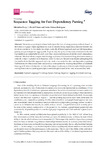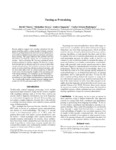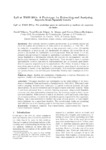Buscar
Mostrando ítems 1-10 de 48
Increasing NLP Parsing Efficiency with Chunking
(M D P I AG, 2018-09-19)
[Abstract] We introduce a “Chunk-and-Pass” parsing technique influenced by a psycholinguistic model, where linguistic information is processed not word-by-word but rather in larger chunks of words. We present preliminary ...
Lyapunov filtering of objectivity for Spanish sentiment model
(IEEE, 2016-07)
[Abstract] Objective sentences lack sentiments and, hence, can reduce the accuracy of a sentiment classifier. Traditional methods prior to 2001 used hand-crafted templates to identify subjectivity and did not generalize ...
On the Processing and Analysis of Microtexts: From Normalization to Semantics
(M D P I AG, 2018-09-18)
[Abstract] User-generated content published on microblogging social platforms constitutes an invaluable source of information for diverse purposes: health surveillance, business intelligence, political analysis, etc. We ...
Tratamiento sintáctico de la negación en análisis del sentimiento monolingüe y multilingüe
(2017-09-19)
[Abstract] Dealing with negation in a proper way is a relevant factor in order to obtain high performance sentiment analysis systems. In this framework, we present a method for the treatment of negation in Spanish that ...
On the Logistical Difficulties and Findings of Jopara Sentiment Analysis
(Association for Computational Linguistics, 2021-06)
[Abstract] This paper addresses the problem of sentiment analysis for Jopara, a code-switching language between Guarani and Spanish. We first collect a corpus of Guarani-dominant tweets and discuss on the difficulties of ...
Sequence Tagging for Fast Dependency Parsing
(2019)
[Abstract]
Dependency parsing has been built upon the idea of using parsing methods based on shift-reduce or graph-based algorithms in order to identify binary dependency relations between the words in a sentence. In this ...
Parsing as Pretraining
(2020)
[Abstract] Recent analyses suggest that encoders pretrained for language
modeling capture certain morpho-syntactic structure.
However, probing frameworks for word vectors still do not report
results on standard setups ...
LyS at TASS 2014: A Prototype for Extracting and Analysing Aspects from Spanish tweets
(Sociedad Española para el Procesamiento del Lenguaje Natural, 2014)
[Abstract]: This paper describes our participation at the third edition of the work- shop on Sentiment Analysis focused on Spanish tweets, tass 2014. This year’s eval- uation campaign includes four challenges: (1) global ...
Supervised polarity classification of Spanish tweets based on linguistic knowledge
(Association for Computing Machinery, 2013)
[Abstract]: We describe a system that classifies the polarity of Spanish tweets. We adopt a hybrid approach, which combines machine learning and linguistic knowledge acquired by means of NLP. We use part-of-speech tags, ...
Parsing linearizations appreciate PoS tags - but some are fussy about errors
(Association for Computational Linguistics, 2022-11)
[Absctract]: PoS tags, once taken for granted as a useful resource for syntactic parsing, have become more situational with the popularization of deep learning. Recent work on the impact of PoS tags on graph- and ...


